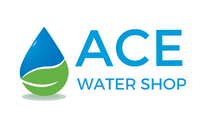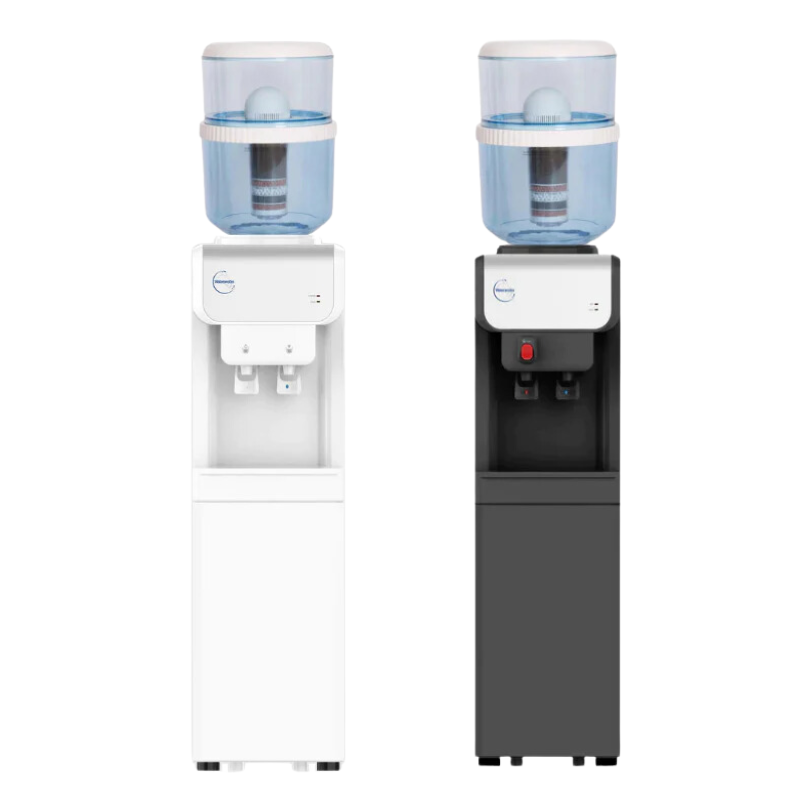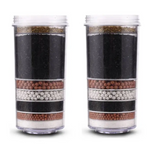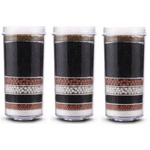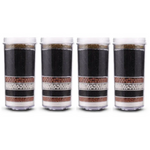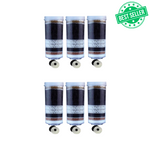You have no items in your shopping cart.
Charcoal has swept the modern world, becoming an indispensable component in many industries, including medical, aesthetic, and agricultural uses. This adaptable chemical is also an important part of the best water filtering systems. In this article, we'll talk all about the charcoal water filters.
But what is it about charcoal that makes it so popular? Let's look at the unique properties and why it's the finest option for water filtration.
If you're seeking for a safe and effective way to remove hard minerals from your home's water supply, you've probably come across charcoal water filters.
First, let's learn what activated carbon and charcoal are and why they are widely used for water filtration.
WHAT IS ACTIVATED CARBON?
Although activated carbon and charcoal have many similarities, they also have some key differences.
Wood, coconut husks, peat, coir, nutshells, lignite, coal, or petroleum pitch are used to make activated carbon. The process comes in two main methods:
- Physical activation can be accomplished in two ways. The first procedure is pyrolization, similar to how charcoal is made. The second approach involves heating carbon to high temperatures, usually between 600 and 1200 degrees Fahrenheit, then exposing it to oxygen or steam.
- Chemical activation is the process of chemically impregnating carbon. Common possibilities include potassium hydroxide, sodium hydroxide, phosphoric acid, and zinc chloride.
Many companies choose chemical activation over physical activation since you can do it faster at reduced temperatures.
WHAT IS CHARCOAL?
Charcoal is formed by burning organic material (most commonly wood) without oxygen. The wood is usually burned at temperatures ranging from 840 to 950 degrees Fahrenheit. The resulting material is allowed to cool once the wood has been burned. The kiln's openings are then closed, depriving the leftovers of oxygen and causing them to char. Pyrosis is the name for this procedure.
Charcoal is high in carbon and can be used for various purposes, including cooking, heating, and filtering.
KEY DIFFERENCES BETWEEN ACTIVATED CARBON AND CHARCOAL WATER FILTERS
It's crucial to remember that the phrases activated charcoal and activated carbon are frequently used interchangeably. Although they share many similarities, there is some evidence that activated carbon is a better option.
The filtering components themselves are the primary distinction between activated carbon and charcoal water filters. Both materials are porous and hard, trapping contaminants. What is the distinction between them?
It's crucial to remember that the phrases activated charcoal and activated carbon are frequently used interchangeably. Although they share many similarities, there's some indication that activated carbon is a better option.
Activated carbon is purer and higher in quality than activated charcoal. You can use it as a filter, and it's far better than not purifying water at all.
Moreover, the purity and performance of activated carbon, when combined with three other filtration technologies, provide the best possible defense for your family.
Activated carbon water filters soften water, minimise soap usage, and even enhance your hair and skin condition.
HOW DOES CHARCOAL FILTER WATER?
Water filters employ a kind of charcoal popular as "activated charcoal" to filter the water.
Adsorption differs from absorption. Activated charcoal water filters work through the adsorption process. The process chemically attaches contaminants to the charcoal water filter's surface instead of absorbing them physically.
It's a good water filter since it removes contaminants without losing important minerals and salts.
Because pollutants are trapped in the filter, you must change them every year to ensure proper operation.
When water passes through active carbon filters, chemicals adhere to the carbon, resulting in cleaner water. The water flow and temperature determine the efficiency. As a result, most smaller active carbon filters must be utilised with cold water and low pressure.
Active carbon filters may have varying capabilities in terms of the size of impurities they remove and surface area. One factor is the activated carbon quality, with coconut shells proving the most efficient. Wood or coal can also be used to make activated carbon, which is supplied as granular activated carbon or carbon blocks.
Another consideration is the particle size that the filter will allow through, as this serves as a second line of defence. Because granular activated carbon (GAC) is porous, it has no set limit. The pore size of activated carbon in the form of carbon blocks, on the other hand, is usually between 0.5 and 10 microns. The issue with the tiniest sizes is that water flow is limited as even the smallest water particles strain to pass through. As a result, common carbon blocks are 1-5 microns in size.
WHAT DOES ACTIVATED CHARCOAL WATER FILTER REMOVE AND REDUCE FROM YOUR WATER?
What chemicals and toxins will it be able to eradicate now? Is every particle that is hazardous to a human body removed? Some of the pollutants and substances it eliminates are listed below. After you've finished reading it, you'll understand the advantages of using an activated carbon filter.
- Pesticides
- Chlorine
- Chlorine Bi-Products
- Nitrate
- Microplastics
- Chloride
- PFOS
- Herbicides
BENEFITS OF CHARCOAL WATER FILTERS
Activated charcoal is a porous substance. It has a large surface area, which improves the adsorption process significantly. A gramme of activated carbon may cover more than 1,500 square metres of surface area.
Charcoal filters are good for filtering since they do not remove the natural properties of the water. Activated charcoal benefits human health in a variety of ways. Continue reading to learn the advantages of utilising a charcoal water filter in your home.
It retains mineral salts.
Water contains minerals and salts that are beneficial to the human body. During the purification process, most water filtration systems remove harmful impurities and beneficial minerals and ions Pollution introduces toxic chemicals and particles that are inappropriate for consumption.
These methods reduce water to its bare essence. It's troublesome since homoeostasis requires certain salts in the water.
Domestic water should not be treated using distillation. Distillation attempts to remove everything else in the water than hydrogen and oxygen.
Activated charcoal's structure and chemistry enable it to bind hazardous natural minerals to the surface. The remainder of the minerals can flow through. You'll need to use another filter to eliminate any microorganisms that your filter can't collect.
Better Water Taste
Some people would rather not drink tap water because they are thirsty. Strange tastes and odours irritate them, so they complain. Chlorine as well as other extra dissolved in the water to eliminate hazardous bacteria cause these irritating features.
The treatment of water is critical for public health. People who dislike the water, on the other hand, may have to go thirsty for several hours before finding an alternative. They may get dehydrated, putting their health at risk.
In addition to removing contaminants, charcoal filters also eliminate any unwanted odours in the water. The filters are appropriate for households that use shared water sources. These sources have strange tastes, scents, and colours in their water.
Low-Cost Installation
Water purification systems are critical expenditures for both residential and commercial properties. Unfortunately, installing the majority of them is prohibitively expensive. Charcoal water filters are an excellent choice because they are inexpensive.
Water suppliers may be able to offer the service to customers at an affordable price due to their low cost.
Easy Maintenance
After a charcoal filter is put in your home, you won't have to bother maintaining it. The filters are simple to maintain and do not necessitate the use of a professional. After the charcoal is depleted, the majority of it entails replacing the filter element.
Before they need to be replaced, the filters can endure for months. You can inspect them after four months, although this is dependent on several factors.
The water quality in your area is the most crucial element to consider when installing new charcoal filters. Filters in families that use more water may need more regular replacement than households that use less.
When it comes to upkeep, the clarity of the water is a good sign. Water's flavour can change over time as well. It may be time to replace the filter if the water has taken on a new colour or flavour.
The components of the filtering system are widely available and inexpensive. If impurities build up in the filters, the water flow may be limited. These signs indicate that the charcoal water filter should be kept in good working order.
Customizable
Varied sorts of water contaminants have different effects on water users. A person in need of drinking water, for example, has other concerns than someone looking to do laundry. Their water purification requirements may change depending on the contaminants to be removed and the degree of refinement.
Customization is possible with charcoal water filtering devices. Customers can choose from various filters designed to address multiple water issues. You can come up with a solution that best suits your needs.
It Doesn't Need Energy To Work.
Because of the current economic situation, everyone is searching for highly effective items to avoid wasting energy. People will be looking for low-power or no-power installation choices.
Electricity is not required to run charcoal filtering systems. Their operation is dependent on the water pressure and the qualities of activated charcoal.
The filtering procedure is self-contained. As a result, charcoal filters offer significant cost savings. Using an electricity-powered water filter comes with recurring costs.
Helps Whiten Teeth
Because of exposure to dangerous substances or poor oral care, some people develop stains on their teeth. Water contains some tooth discolouring chemicals, such as fluoride.
Activated charcoal helps restore the condition of the teeth regardless of how the stain is acquired. To begin with, there's no need to be concerned about water pollutants that could harm your teeth. Second, activated charcoal cleans teeth through adsorption in the same way it cleans water.
Charcoal ions and surfactants can help erase teeth stains and reduce mouth odour. It helps in maintaining a healthy mouth, brighter teeth, and cleaner breath.
BUY ACTIVATED CARBON AND CHARCOAL WATER FILTERS
Charcoal water filters remove chemicals and pollutants from water using charcoal. Chemicals can adhere to the surface of each charcoal particle by adsorption. However, the nutrients and minerals are retained, providing flavour and health advantages.
This filtration is a passive water purifying technology. It doesn't require any electricity or other forms of energy. To remove contaminants from water, it uses water pressure and the structure of active charcoal.
Regular cleaning and replacing widely available filter elements are required for its upkeep. It makes it cost-effective to operate. Even better, the installation and maintenance costs are very modest.
If you're looking for a filtration system, Ace Water Shop Australia can help you choose the correct one.
